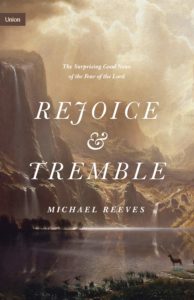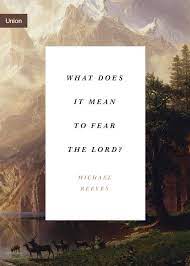 One of the confusing, troubling facts of life in the last decade or so has been the absolute sky-rocketing of anxiety all around us.
One of the confusing, troubling facts of life in the last decade or so has been the absolute sky-rocketing of anxiety all around us.
Here is a helpful, proactive thought. What if the answer to our anxiety was not less fear, but more? What if the problem is not that we have fear, but that we have the wrong kind of fear? What if it’s not that we get afraid, but that we fear the wrong things? What if, after all is said and done, our deepest pathology is that we don’t fear the One being in the world we need to fear, and that we don’t fear him in the one, right way, and that is why we’re so afraid of everything else?
I have to admit I had begun to wonder if the fear of God was the answer to all our anxieties. After all, a chief way to attack a problem is to find everything the Bible says about it (and then meditate on those things, and pray over them), and when you do that work, you can’t help but notice how much the Bible has to say about about fear in two directions. The Bible talks about letting go of fear of the future, and fear of man, and other fears like that, and also of embracing the fear of God.
And that is why I was excited when Dan Unger told me about Michael Reeve’s new book, Rejoice & Tremble, and especially about its subtitle: The Surprising Good News of the Fear of the Lord. I can’t recommend this book highly enough. It is both an accessible yet thorough study on this important Bible doctrine, but also a very practical guide to hearing what the scripture says about defeating Fear, our enemy. For instance:
Moral confusion is not the root of our anxiety: our moral confusion today and our general state of heightened anxiety are both the fallout of a cultural loss of God as the proper object of human fear. That fear of God (as I hope to show) was a happy and healthy fear that shaped and controlled other fears, thus reining in anxiety.
With society having lost God as the proper object of healthy fear, our culture is necessarily becoming ever more neurotic, ever more anxious about the unknown – indeed, ever more anxious about anything and everything. Without a kind and fatherly God’s providential care, we are left utterly uncertain about the shirting sands of both mortality and reality. In ousting God from our culture, other concerns – from personal heathy to the health of the planet – have assumed a divine ultimacy in our minds. Good things have become cruel and pitiless idols. And thus we feel helplessly fragile. No longer anchored, society fills with free-floating anxieties. (Where fear is a response to something specific, anxiety is more of a general condition, like something in the atmosphere. Anxiety can therefore latch on to anything and morph effortlessly in a moment: one minute we are concerned about knife crime, the next about climate change.)
A happy and healthy fear. If that sounds paradoxical to you, or just downright odd, I encourage you to grab this book and press into the truths Reeves unpacks. A few pages later, he goes further, discussing the idea of discomfort in general:
Where discomfort was once considered quite normal (and quite proper for certain situations), it is now deemed an essentially unhealthy thing. It means, for example, that a university student can say, “I am uncomfortable with your views,” and consider that a legitimate argument for shutting down further discussion. For it is not acceptable to make someone uncomfortable.
It means that in a culture awash with fear and anxiety, fear is increasingly seen as a wholly negative thing in society. And Christians have been swept along in that greater tide of opinion, adopting society’s negative assessment of all fear. Small wonder, then, that we shy away from talking about the fear of God, despite its prominence in Scripture and in Christian thought historically. It is completely understandable, but it is tragic: the loss of the fear of God is what ushered in our modern age of anxiety, but the fear of God is the very antidote to our fretfulness.
So here you go:  Lose the fear of God, plunge into anxiety. Find the fear of God, find the antidote to anxiety.
Lose the fear of God, plunge into anxiety. Find the fear of God, find the antidote to anxiety.
I can’t recommend this book highly enough. You can pick it up at the bookstore, or online, or you can listen to it free on hoopla with a library card. (The author reads it himself, and he’s one of the best audiobook readers I’ve heard.) And…if you really don’t want to commit to the full 150-page version, there is also a scaled back, small, 60-page paperback version. It’s also free to listen to on hoopla. Enjoy.
And let me know how you like it.
